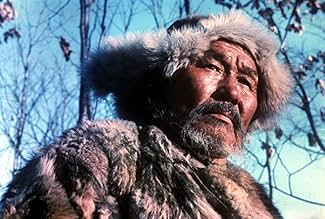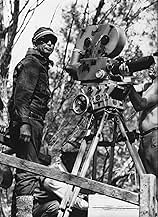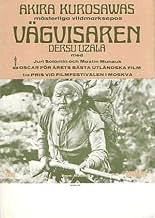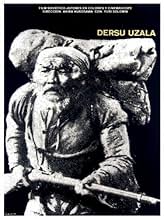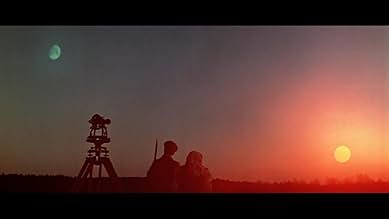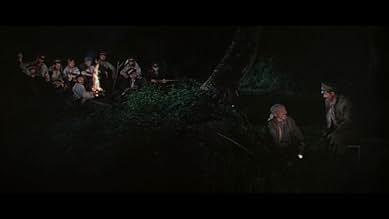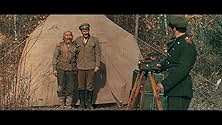IMDb रेटिंग
8.2/10
35 हज़ार
आपकी रेटिंग
अपनी भाषा में प्लॉट जोड़ेंThe Russian army sends an explorer on an expedition to the snowy Siberian wilderness where he makes friends with a seasoned local hunter.The Russian army sends an explorer on an expedition to the snowy Siberian wilderness where he makes friends with a seasoned local hunter.The Russian army sends an explorer on an expedition to the snowy Siberian wilderness where he makes friends with a seasoned local hunter.
- निर्देशक
- लेखक
- स्टार
- 1 ऑस्कर जीते
- 8 जीत और कुल 1 नामांकन
Mikhail Bychkov
- Otryad Arseneva
- (as M. Bychkov)
Vladimir Khrulyov
- Otryad Arseneva
- (as V. Khrulyov)
Stanislav Marin
- Otryad Arseneva
- (as S. Marin)
Igor Sykhra
- Otryad Arseneva
- (as I. Sykhra)
Vladimir Sergiyakov
- Otryad Arseneva
- (as V. Sergiyakov)
Yanis Yakobsons
- Otryad Arseneva
- (as Ya. Yakobsons)
Vladimir Khlestov
- Otryad Arseneva
- (as V. Khlestov)
Vladimir Sverba
- Otryad Arseneva
- (as V. Sverba)
Vladimir Kremena
- Turtygin
- (as V. Kremena)
Aleksandr Pyatkov
- Olenev
- (as A. Pyatkov)
फ़ीचर्ड समीक्षाएं
I own many of Akira Kurosawa's films. I have Ran, Throne of blood, Seven Samarai, Roshomon, Dreams, Hidden Fortress, Jojimbo, Snajuro, Red Beard, and even "Kurosawa" the documentary. I guess you can say that I like his work. The "Kurosawa" documentary narrated by Sam Shepard and produced by thirteen / WNET I recommend for anyone at all interested in Kurosawa's films as it will really wet your appetite.
Of all of his films, Dersu Uzala is my favorite. It is also one of my favorite films by anybody. It was done shortly after Akira had went through a very dark time in his life and had attempted suicide. It was his first film afterwards and the content of the film appears to reflect more than a little of his mindset at the time. Dersu Uazla is both a feel good film and also a sad film. It touches the way that people as they grow older have a more and more difficult time adapting to life as it changes and has its affect on them. The end of the film can certainly show light on the inhumanity that appears to be growing more prevalent in our society. But, I think what you remember from the film is the love between two individuals, and that is what feels good.
Many of Kurosawa's films have a great deal of spectacle, and he is perhaps known best for his Samarai films. There is none of that in this movie. Dersu Uzala is a statement by Akira of life. Akira was fighting to keep making films and was not having an easy time of it. If Akira Kurosawa could not make films, he could not feel that he was living. As a result, he attempted suicide. He survived to make this film plus many others that we all enjoy today. Dersu Uzala may be the most important of his films and the one that shows the great director's true personality. Just perhaps, it shows more about humanity than any of his other films. Again, it is my favorite.
Of all of his films, Dersu Uzala is my favorite. It is also one of my favorite films by anybody. It was done shortly after Akira had went through a very dark time in his life and had attempted suicide. It was his first film afterwards and the content of the film appears to reflect more than a little of his mindset at the time. Dersu Uazla is both a feel good film and also a sad film. It touches the way that people as they grow older have a more and more difficult time adapting to life as it changes and has its affect on them. The end of the film can certainly show light on the inhumanity that appears to be growing more prevalent in our society. But, I think what you remember from the film is the love between two individuals, and that is what feels good.
Many of Kurosawa's films have a great deal of spectacle, and he is perhaps known best for his Samarai films. There is none of that in this movie. Dersu Uzala is a statement by Akira of life. Akira was fighting to keep making films and was not having an easy time of it. If Akira Kurosawa could not make films, he could not feel that he was living. As a result, he attempted suicide. He survived to make this film plus many others that we all enjoy today. Dersu Uzala may be the most important of his films and the one that shows the great director's true personality. Just perhaps, it shows more about humanity than any of his other films. Again, it is my favorite.
This 1975 joint Japanese-Russian film is a celebration of simple virtues, friendship, loyalty, love, and respect for nature. Based on the journals of the Tsarist explorer and surveyor, Captain Vladimir Arseniev, it is the story of the relationship between Captain Arseniev and an Asiatic hunter of the Goldi tribe named Dersu Uzala. With a love and understanding of the forest that is extraordinary, Dersu guides the Captain through several deadly encounters. He saves the Captain's life by building a shelter out of reeds during a ferocious wind storm. Maksim's performance as Dersu, the ancient woodsman, is very "Yoda-like": wonderous, dignified, and very natural.
The friendship between the two main characters grows over many years and several expeditions in the wild. Their relationship is beautifully developed and moves to an inevitable climax when Dersu and the Captain move back to the Captain's home in the city.
There is in this film a sense of the beauty, tranquility, and timelessness of nature. It takes place at a time in the early part of the last century when people had closer ties with nature and felt a kinship with animals, plants, and the elements. Dersu endearingly refers to all elements of nature including the river, the wind, the trees, and the animals as "men". As the English writer, Hugh Trevor-Roper said of Shakespeare so it is true of Dersu, "He sees mankind almost as part of nature, sometimes basking in a delightful, smiling Nature; sometimes caught up in a fierce, cruel, inexorable, insatiable Nature".
I was totally absorbed in this film and in its regard for the essential goodness of man and the beauty of the natural world. Dersu Uzala is a great film from one of the all-time masters.
The friendship between the two main characters grows over many years and several expeditions in the wild. Their relationship is beautifully developed and moves to an inevitable climax when Dersu and the Captain move back to the Captain's home in the city.
There is in this film a sense of the beauty, tranquility, and timelessness of nature. It takes place at a time in the early part of the last century when people had closer ties with nature and felt a kinship with animals, plants, and the elements. Dersu endearingly refers to all elements of nature including the river, the wind, the trees, and the animals as "men". As the English writer, Hugh Trevor-Roper said of Shakespeare so it is true of Dersu, "He sees mankind almost as part of nature, sometimes basking in a delightful, smiling Nature; sometimes caught up in a fierce, cruel, inexorable, insatiable Nature".
I was totally absorbed in this film and in its regard for the essential goodness of man and the beauty of the natural world. Dersu Uzala is a great film from one of the all-time masters.
9vdg
..and his name was Akira Kurosawa. Once upon a time there was a simple man: a hunter, and simple story of friendship and reflection about life. Once upon a time a magnificent director and film crew have put a beautiful story on the screen with such perfection, that in our days we look back and we wonder: why movies like this are not being made anymore??
It doesn't matter if you like any other Kurosawa's works or any other 'Russian' films, because this one would touch you so much that you would go back and looked for similar films I wish I could see this film in all his beauty: on a big screen, in the original format (70 mm), as I felt that I missed a lot of details from the TV format.
There are directors and there is Kurosawa, there are dramas and there are Russian stories, so when you put both of them together, what do you get? Dersu Uzala!
Enjoy it, at least as much I did
It doesn't matter if you like any other Kurosawa's works or any other 'Russian' films, because this one would touch you so much that you would go back and looked for similar films I wish I could see this film in all his beauty: on a big screen, in the original format (70 mm), as I felt that I missed a lot of details from the TV format.
There are directors and there is Kurosawa, there are dramas and there are Russian stories, so when you put both of them together, what do you get? Dersu Uzala!
Enjoy it, at least as much I did
This is one of my definite favorites.It tells a story of a man who is one with the wilderness and nature and cant live any other way.Dersu Uzala is an old Goldi(siberian asiatic minority) hunter who thinks he has been cursed after he kills a tiger.To him,every being,every part of the nature is equally worth as humans.
The film gives us accounts of one Russian captain's friendship with Dersu.They are together through thick and thin and Dersu even rescues him from a blizzard when they are stuck on a frozen lake.Dersu has all the natural senses and therefore knows when he is in danger.He knows everything by looking and observing the landscape around him.
So when he kills the tiger,its like a spell has been cast on him.Or is it just his imagination?His people believe in a ghost that rules the taiga,Kanga.He thinks Kanga will punish him in some way.Soon his fears start to get real.He cant kill his prey for food that he needs for living because his eyesight dramatically worsens.One frightening night(my favorite scene) it gets too much for him,listening to the howling wind in the dark,waiting for Kanga to send a tiger to kill him.And captain Arseniev,seeing the horror that struck him,offers him to come with him to his hometown.It happens so.
Throughout the film,you cant help but wonder what will happen to Dersu.Not only because in the beginning Arseniev searches for his grave,in retrospection,but also because he is one lonely,sad man who lives only by hunting.There is no place for him but the taiga.And when the tragedy happens,its hard not to feel remorse and pity the old Dersu.His world has come crashing down.The end specially is painful and shows that there is no mercy in this world for a man who falls from grace in his own homeground.
In the end,this film has outstanding photography,outstanding music,outstanding cast,beautiful scenery and do i need to say anything about the director? A timeless work that can never be surpassed.
The film gives us accounts of one Russian captain's friendship with Dersu.They are together through thick and thin and Dersu even rescues him from a blizzard when they are stuck on a frozen lake.Dersu has all the natural senses and therefore knows when he is in danger.He knows everything by looking and observing the landscape around him.
So when he kills the tiger,its like a spell has been cast on him.Or is it just his imagination?His people believe in a ghost that rules the taiga,Kanga.He thinks Kanga will punish him in some way.Soon his fears start to get real.He cant kill his prey for food that he needs for living because his eyesight dramatically worsens.One frightening night(my favorite scene) it gets too much for him,listening to the howling wind in the dark,waiting for Kanga to send a tiger to kill him.And captain Arseniev,seeing the horror that struck him,offers him to come with him to his hometown.It happens so.
Throughout the film,you cant help but wonder what will happen to Dersu.Not only because in the beginning Arseniev searches for his grave,in retrospection,but also because he is one lonely,sad man who lives only by hunting.There is no place for him but the taiga.And when the tragedy happens,its hard not to feel remorse and pity the old Dersu.His world has come crashing down.The end specially is painful and shows that there is no mercy in this world for a man who falls from grace in his own homeground.
In the end,this film has outstanding photography,outstanding music,outstanding cast,beautiful scenery and do i need to say anything about the director? A timeless work that can never be surpassed.
Akira Kurosawa was a masterful director and powerful storyteller, Dersu has always been my favourite of his films. It was also the first I saw - on Christmas Day afternoon 1978 on UK BBC2 - would that they were as adventurous nowadays! Since then of course I've seen all of his films from Stray Dog on, Rashomon and Ran being especial favourites, but I keep on coming back to watch this one, ostensibly the simplest tale Kurosawa ever filmed.
The understanding and bonding that develops between the two men Arseniev and Dersu is wonderful to see, and over two hours holds your attention with expertly observed minutiae of character and scenic interplay. The last ten minutes cover a lot of ground (no pun intended) but it's all so logical and sad that I always need to see the end credits to recover.
So many marvellous scenes: the tiger in the forest in the morning; the phlegmatic reclusive old Chinaman; the raft; wispy blue shaded smoke from night-fires; the conclusion of course; the view of those two great men, the Moon and the Sun in the same shot. Not everyone would like Dersu, their most likely comments being "boring" - but how wrong they are they'll never know!
A film not fit to lick Dersu Uzala's metaphorical boots (or even Plan 9 from Outer Space's for that matter), Blazing Saddles was filmed the same year in America and a generation on still gets more praise than this poetic masterpiece!
The understanding and bonding that develops between the two men Arseniev and Dersu is wonderful to see, and over two hours holds your attention with expertly observed minutiae of character and scenic interplay. The last ten minutes cover a lot of ground (no pun intended) but it's all so logical and sad that I always need to see the end credits to recover.
So many marvellous scenes: the tiger in the forest in the morning; the phlegmatic reclusive old Chinaman; the raft; wispy blue shaded smoke from night-fires; the conclusion of course; the view of those two great men, the Moon and the Sun in the same shot. Not everyone would like Dersu, their most likely comments being "boring" - but how wrong they are they'll never know!
A film not fit to lick Dersu Uzala's metaphorical boots (or even Plan 9 from Outer Space's for that matter), Blazing Saddles was filmed the same year in America and a generation on still gets more praise than this poetic masterpiece!
क्या आपको पता है
- ट्रिवियाAkira Kurosawa had hoped to make this film as early as in the 1950s, but he had trouble adapting the story to a Japanese setting, never thinking that one day he would actually be able to film it on location in Russia, and with Russian actors.
- गूफ़When Dersu and Arsenev are looking at the 3/4 moon and the setting sun, the moon is in the wrong phase to appear in the sky at the same time as the sun.
- भाव
Dersu Uzala: How can people live in a box?
- कनेक्शनFeatured in For the Love of Movies: The Story of American Film Criticism (2009)
टॉप पसंद
रेटिंग देने के लिए साइन-इन करें और वैयक्तिकृत सुझावों के लिए वॉचलिस्ट करें
- How long is Dersu Uzala?Alexa द्वारा संचालित
विवरण
बॉक्स ऑफ़िस
- बजट
- $40,00,000(अनुमानित)
- दुनिया भर में सकल
- $14,480
- चलने की अवधि
- 2 घं 22 मि(142 min)
- रंग
- पक्ष अनुपात
- 2.20 : 1
इस पेज में योगदान दें
किसी बदलाव का सुझाव दें या अनुपलब्ध कॉन्टेंट जोड़ें


